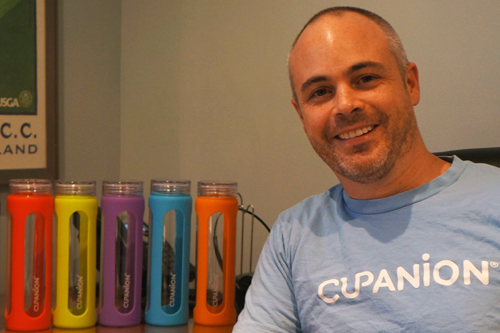
Matt Wittek hopes to one day put an end to the use of disposable bottles and cups.
The U of G graduate is the owner of Cupanion, a local company that sells reuseable drink containers. Starting up his own business has enabled Wittek to mix his entrepreneurial spirit with his passion for the environment.
“I saw an opportunity to make a difference as well as an opportunity to grow a business,” says Wittek, who graduated with a bachelor of commerce in 2003.
He estimates that Cupanion has reduced the use of disposable containers by more than 15 million bottles and cups and eliminated close to 243,000 pounds of waste from landfill since its inception four years ago.
Wittek owns the company with his wife, Brenda, who is also a U of G grad. It all began with the idea of providing reuseable cups to coffee chains and food service companies.
“When you purchase one cup of coffee or tea in a disposable container every day, you create about 23 pounds of waste every year,” says Wittek. “By using a reuseable cup, customers can make an immediate impact.”
The concept caught on not only because it’s environmentally friendly but also because of the cost savings. Businesses can save money on disposable cups, and customers can enjoy the discounts offered by many coffee shops to those using reuseable cups, he says.
Cupanion cups and bottles have been sold at Second Cup, Williams and Coffee Culture as well as on 20 university and college campuses across Canada, including U of G.
“We are excited to work with the student market because if we can get students involved in waste-reduction at school, then there is a better chance the habit will continue after they leave school,” he says.
Given the initial success of Cupanion, Wittek decided to expand his business by selling reuseable stainless steel cups geared towards festivals, including Guelph’s Hillside Festival. He has also tapped into the retail sector by selling glass and stainless steel water bottles to various grocery chains across North America. Wittek is also targeting corporations by providing the option of having his products branded with their logo so they can be used for promotional purposes.
“We are constantly coming out with new products and looking for new ways to reduce disposable waste,” he says.
In 2012, Wittek wanted to make an even bigger impact through his business by creating the Fill it Forward program. For every mug or bottle purchased, Cupanion donates money towards providing clean water to those in need.
The program is run in partnership with WaterCan, a non-profit organization dedicated to providing clean water and sanitation to people in developing countries. In just under a year, Cupanion has donated more than $5,000 to the cause, which equals more than 250,000 cups of clean water.
“We have always felt our business should be bigger than us,” he says. “It’s not just about trying to sell as many bottles and cups as possible. There needs to be some social responsibility. It grounds us and gives us something to rally around.”
This is not the first time Wittek has helped retailers and consumers make a difference. Before establishing Cupanion, Wittek took the lead on a project geared towards eliminating disposable plastic bags by creating affordable cloth bags for retailers to sell to customers.
Not only was he involved in producing and marketing the product for a company called InStore Products, but he also helped create an awareness campaign that involved a small town in Manitoba becoming the first city in North America to ban disposable plastic bags.
“It was covered by media outlets around the world, which raised awareness of how much waste plastic bags create,” he says. “Now you see reuseable bags and boxes being used everywhere.”
Wittek left the company a few years later because he had always dreamed of starting his own business, and he knew providing reuseable bottles and cups would allow him to achieve something beyond just making money.
“My real passion is trying to find products or services that can create multidimensional value,” he says. “The environment is important, our customers’ ability to make a profit and reduce costs are important, and social responsibility is important. I think when you bring all these elements together it creates a much more compelling story.”